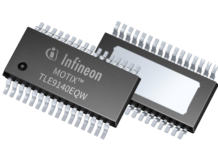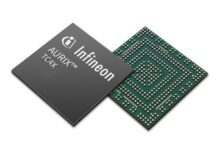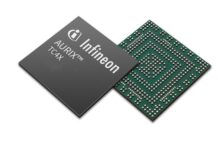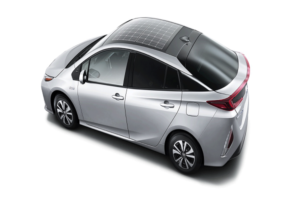
Shortly after Toyota unveiled a new solar roof option for the 2017 Prius Prime, Tesla CEO Elon Musk announced that the Tesla Model 3 will “probably” also have a solar roof option.
Now we learn that Panasonic, a current solar cell and battery cell supplier for Tesla, is releasing a new solar product designed for automotive applications, which will first be used in Toyota’s solar roof option for the Prius.
Today, Panasonic revealed the new product called “HIT™ Photovoltaic Module for Automobile” in Osaka, Japan.
The problem with solar panels on vehicles is that they don’t generate enough electricity to do much of anything. Toyota already had an option for a solar roof on the previous PHEV Prius, but it was only generating 50 W and powering the fans for the AC.
Panasonic’s new product allows for a 180 W module on the Prius Prime and for the first time, it will be able to recharge the powertrain battery (as well as the 12 V battery). The company wrote in a press release today:
Panasonic’s solar cells have a unique structure that combines a crystalline silicon substrate and an amorphous silicon film, and feature high conversion efficiency and excellent temperature characteristics. Conventional automotive solar cells can output up to several tens of watts and have been used only for the auxiliary charging of 12 V batteries and ventilation power sources for parked cars; however, the use of the features of Panasonic’s solar cells allow a high output (approx.180 W) in a limited area on a car’s roof, enabling the charging of the drive lithium-ion batteries as well as 12 V batteries, resulting in a possible extension of an EV’s travel distance and increased in fuel economy.
It’s an improvement, but it’s not quite practical yet.
Koji Toyoshima, Toyota’s chief engineer for the Prius plug-in, says that the solar panel will increase car’s efficiency by up to 10 percent. In good conditions, the panel will likely add about 2.2 miles of electric range to the vehicle throughout the day. Even that seems extremely optimistic as have Toyota’s electric estimates in the past. But, over the lifetime of the car, it might make a small dent in your energy usage and that’s certainly a good thing.
The option is currently not available in US because the reinforced glass sheeting currently used for the solar panel is not passing the US rollover crash tests. They are reportedly working on a solution, but there’s no timeline for a US debut.
Here’s the roof produced by Panasonic:
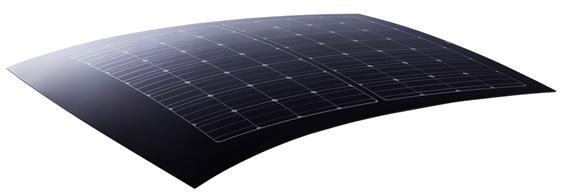
Panasonic already signed a deal to supply solar cells to Tesla for its solar roof products built with the company’s own ‘Tesla Glass’, but that’s for roofs on actual houses – though the technology required is not that different from a car’s roof.
The Japanese manufacturer said today that it wanted to expand the use of its new solar cell technology in cars:
“Panasonic will make efforts to expand the use of the “HIT™ Photovoltaic Module for Automobile” and contribute to the achievement of an environmentally friendly society in the automotive as well as the housing and industrial fields.”
Last November, Musk said that Model 3 will “probably” also have a solar roof option, but unlike Toyota’s, Musk hinted that it could be deployable in order to have a greater capacity – like “a retractable hard top”.
The CEO also said that Tesla could hold back some of the more complicated features of the Model 3 for future versions in order to facilitate the production plan.
What do you think? Will the Model 3 feature a solar roof option? Let us know in the comment section below.
Source: https://electrek.co/



